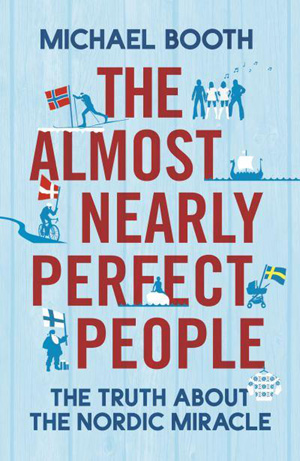
This article is from the Spring 2014 issue of New Humanist magazine. You can subscribe here.
My first thought on picking up The Almost Nearly Perfect People was “why would people be interested in a book about the Nordic countries? We are kind of dull.” This, as I quickly learned, was a question my fellow Nordics often posed to the author, British journalist Michael Booth. Are there enough juicy bits to fill an entire book about these small nations that only feature in the news when they top yet another “best places to live” study? Booth sets out to prove that neither is the North as boring as its inhabitants tend to think, nor is it the collection of perfected societies that foreign media coverage suggests.
Booth recounts his journey through the region in a highly entertaining combination of Bill Brysonesque travel writing, lessons in regional history and interviews ranging from the mayor of Malmö (home of Sweden’s Rosengård housing estate, scene of the 2010 riots) to Santa Claus. The more serious parts of the book delve into the murky secrets of countries celebrated as the home of democracy and equal opportunity: Booth’s account of Anders Behring Breivik’s mass killings in Norway, or Iceland’s corrupt bankers and politicians who drove the country into an unprecedented economic crisis, challenges any view of the North as uniformly rational and egalitarian.
The theme of the “Nordic Miracle” features throughout the book, with Booth introducing countless – maybe a few too many – studies, polls and surveys that seem to indeed confirm that the Nordics excel in everything from education to gender equality (with some surprising exceptions, such as the Danes’ poor health and the Finnish kids’ dislike of school). Covering five countries inevitably means that much needs to be left out. I would have enjoyed more on Iceland, little understood even by its neighbours. Also, hearing more from ordinary locals instead of expats and researchers would have provided more depth, even if the stoic Nordics are nearly impossible to interview (especially us Finns, apparently, whom Booth describes as “the heaviest dance partners conversation-wise”).
In the end, the reader is left with a somewhat contradictory image. These are nations of homogenous dullness, all too prevalent racism, outrageously high taxes and over-stretched public sectors; but at the same time the home of quirky people with the highest levels of social mobility and trust in the world. The author’s own love-hate relationship with his adopted home of Denmark is the evident inspiration for his journey – and a sentiment that suggests he may understand this “schizophrenic self-image” of the Nordic folk better than he might think.
If your Nordic knowledge is limited to ABBA, snow and Vikings, read this book. Even if you are a seasoned traveller, or one of the “humbly proud” inhabitants, The Almost Nearly Perfect People will give you new perspectives and questions to mull over the next time you hear of another lifestyle ranking topped by the Nordic nations: is Sweden really a totalitarian state? Why do Finns love to discredit their own country? Are the Danes and the Norwegians chronically lazy? Does Iceland lack a truly free press? And finally, why do all the other Nordics hate the Swedes?
Michael Booth's The Almost Nearly Perfect People: the Truth About the Nordic Miracle is published by Jonathan Cape

